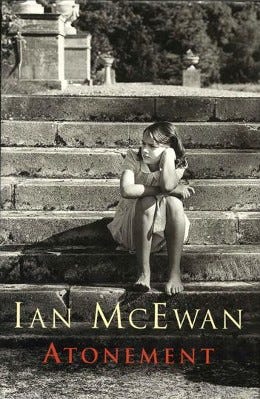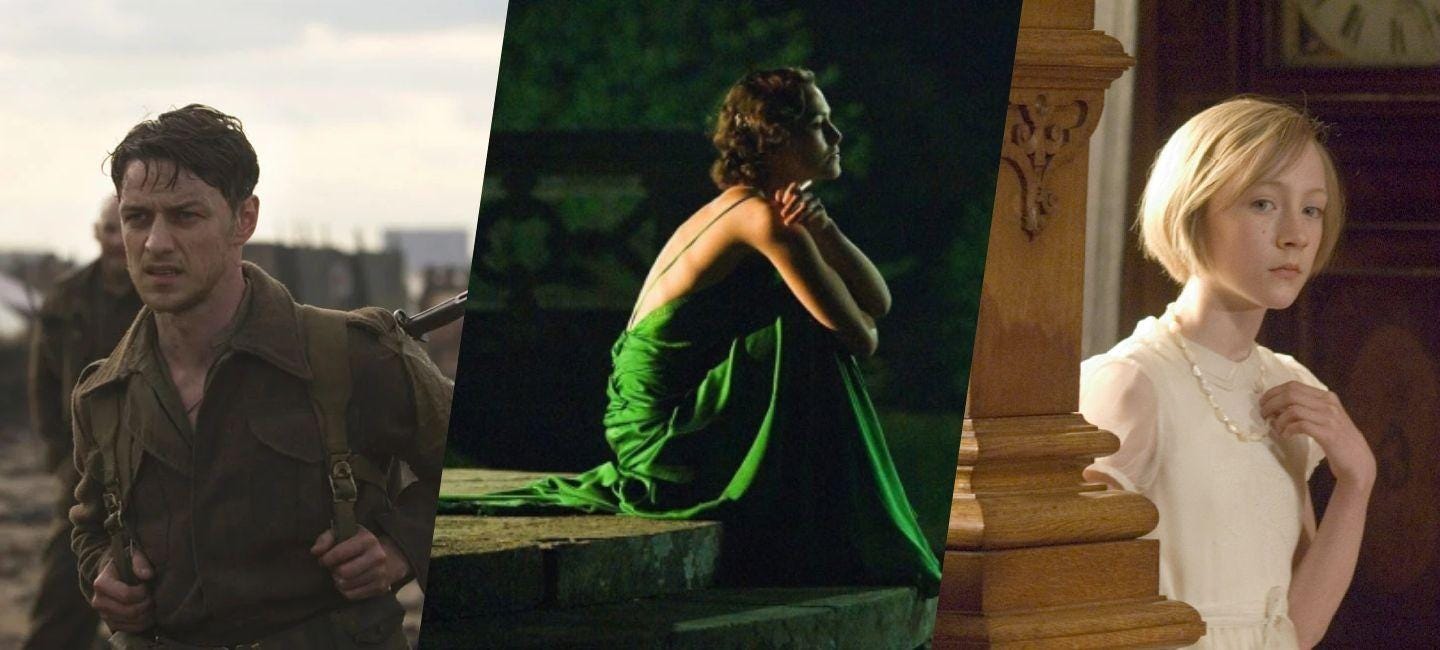Track 7: Atonement
A brutal tale underscoring the impact of misinterpretations, lies, and trying to make amends in an impossible situation.
Oh, to be a junior in high school, watching Atonement for the first time. The film first entered my orbit by way of Tumblr. In my endless blogging and reblogging, I came across a photoset of stills from the movie. The lush green hues paired with faces that I recognized (Keira Knightly? James McAvoy? Come on. Swoooooon) peaked my interest. One watch turned to two turned to twenty. Though the film is deeply depressing, I’ve come to classify it as a comfort watch, particularly when life is really putting me through it. If nothing else, it exercises a good, healthy cry from my system. It’s a nice hard reset.
Atonement is a heartbreaking film in too many ways to recount. The twist ending still guts me to this day. I credit this wholly to Ian McEwan; In 2001, McEwan penned Atonement, the book from which this movie is adapted. If you haven’t read his work, I highly encourage you to pick up any of his works. His storytelling is fascinating and lovely, and even in the film, it is evident that McEwan’s foundational work was kept intact.
The Bio
Atonement is a romantic drama following Briony and Cecilia Tallis, and the latter’s lover Robbie — their housekeeper’s son— in 1930s England. Cecelia and Robbie share a tense and mysterious relationship, which Briony observes from a distance and interprets in a negative light. After a fight, between the two, Robbie pens Cecilia many drafts of apology letters, one of which Briony finds, further tainting her view of Robbie. When the Tallis’ visiting cousin endures an horrifying assault, Briony accuses Robbie of a crime he didn't commit. This lie alters the course of their lives and sets the rest of the film’s plot in motion. We follow the lives of Cecelia, Robbie, and Briony who, through the thick of World War II, are separated and brought back together over the years. This film is a master class in deception, the endless chase for forgiveness, and living with the consequences of your actions.
Some Details & Accolades
Directed by Joe Wright, Atonement was released in 2007. Wright is also behind many other well-known films, including Pride & Prejudice (2005), The Darkest Hour (2017), and Cyrano (2021). The film took home a Golden Globe for Best Motion Picture - Drama, an Oscar for Best Original Score, and earned numerous Oscar nominations, including Best Picture, Best Adapted Screenplay, and Best Supporting Actress for Saoirse Ronan.
The Key Players
Briony Tallis: One of three main characters, Briony is a precocious and keenly observant girl when viewers first meet her. She develops a childish crush on Robbie, and her own naivete and jealously gets the better of her, causing her to upend the lives of two people she loves. She is played by Saoirse Ronan, Romola Garai, and Vanessa Redgrave respectively, all of whom deliver fantastic performances.
Cecila Tallis: Fiery and independent Cecelia is equal parts stubborn and smart. She falls in love with Robbie, and despite being put into a terrible situation, continues to fight to be with him. Keira Knightly shines in this role from start to finish.
Robbie Turner: Son of the Tallis’ housekeeper Grace, Robbie is a Cambridge-educated young man, an education provided by the Tallis family. He is fiercely loyal with a stubborn streak of his own, and an unwavering dedication to Cecelia. The ever-talented James McAvoy brings this character to life.
Lola Quincey: Portrayed by Juno Temple, Lola is one of three cousins visiting the Tallis family. She is assaulted by Paul Marshall, who she eventually marries. Her attack is a catalyst for Briony’s ultimate betrayal.
Paul Marshall: A friend of eldest Tallis child, Leon, Paul’s visit to the Tallis home coincides with Lola and her brothers’ visit. The man is a perv and a creep, and he is well-played by THE Benedict Cumberbatch.
Deconstructing the Track
From first watch, it was clear to me that a fundamental shift had taken place. At such a pivotal age (17), I firmly believe that this was a film that I needed to see. I can’t even begin to tally the number of fabrications I’d crafted in my life up until that time. Little lies here and there. Small betrayals that are classic hallmarks of youth. I was certainly not out here telling life-altering, earth-shattering lies, but I also was not fully cognizant of the weight of spreading falsehoods. Atonement provided a crucial warning that every lie big and small carries a consequence with it. This messaging caused me to look a little more inward, to give pause to the need to fabricate details or spin tales that weren’t the full truth.
The film also heavily informed my depressed Tumblr high school era. If you dig deep into the archives of my account, you will find countless reblogged Atonement photosets, gifs, and quotes. I was a moody, angsty teen and this movie was like kindling. I embraced the dark, brooding elements of the movie, crawling inside the warmth of that darkness. The film replicated all-too-familiar feelings of despair and loathing, but with an origin that I could identify. I could point to specific events in the film and say, “Ah, this is the cause of that reaction. This is what is producing that feeling.” That is why film and music and literature are so vital. They help us reckon with feelings, or at least give us some semblance of control when we can duplicate those feelings in a controlled setting. That is what Atonement was for me. An escape and an answer.
Thank you for listening.




